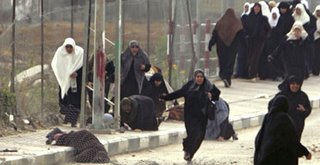 Het getreiter, de vernederingen en de dagelijkse terreur van de Israelische staat houden maar niet op. Europa en de VS steunen dit terrorisme politiek en militair. Dat gegeven speelt geen enkele rol in de Nederlandse verkiezingen. Totdat er een zware aanslag in de polder plaatsvindt en iedereen zich afvraagt hoe dat toch kan. De Nederlandse commerciele massamedia mogen dan wel over de terreur van de 'joodse staat' zwijgen, de buitenlandse kwaliteitspers besteedt er wel degelijk structureel aandacht aan.
Het getreiter, de vernederingen en de dagelijkse terreur van de Israelische staat houden maar niet op. Europa en de VS steunen dit terrorisme politiek en militair. Dat gegeven speelt geen enkele rol in de Nederlandse verkiezingen. Totdat er een zware aanslag in de polder plaatsvindt en iedereen zich afvraagt hoe dat toch kan. De Nederlandse commerciele massamedia mogen dan wel over de terreur van de 'joodse staat' zwijgen, de buitenlandse kwaliteitspers besteedt er wel degelijk structureel aandacht aan.De Independent bericht:
'Poverty-stricken Palestinians desperate to profit from West Bank olive harvest.
By Eric Silver in Deir al-Ghusoun, West Bank
Published: 03 November 2006
Palestinians like to compare themselves to the olive tree. You can chop it down, they say, you can burn it, but it still grows back.
As the harvesting of the West Bank's most profitable cash crop gets under way, the resilience of both is paying off. Thousands of trees in the rocky hills around Tulkarm are cascading with the ripe green fruit.
Despite a campaign of intimidation by militant Jewish settlers, confiscations of land for Israel's security barrier, and travel restrictions that make it difficult for farmers to tend their trees and move their crops, 2006 promises a bumper harvest - if only the Palestinians can market it.
They certainly need to. Abdullah Abdel-Khader, a 70-year-old farmer from the border village of Deir al-Ghusoun, said his 950 olive trees were now his family's only source of income. His six sons lost their jobs in Israel after the army withdrew their permits. "We've hit rock bottom," he lamented. "We eat chicken once or twice a month, mutton three times a year on Muslim festivals."
A razor-wire stretch of the Israeli barrier cuts him off from 300 of his trees. Sometimes soldiers let workers through a gate, sometimes they don't. Only Palestinians with security clearance are allowed to cross. At the moment, Mr Abdel-Khader said he was managing.
But another farmer, loading bulging olive bags on a donkey, said: "Today the soldiers said, 'Fine, go ahead'. But other days they curse us. Who are they to tell me every morning whether I can work my own land?"
Khaled A'alayan, chairman of the local district council, reported that 60 per cent of the 10,000 villagers were unemployed. "We, as a council, are owed 3 million shekels (£375,000) for electricity and water bills. Women have started selling their jewels. Many people depend on charity, local and foreign."
The barrier had made things worse, he added. Israel had confiscated 625 of the villagers' 4,000 acres to build the barrier. More than 500 families had lost their main source of income.'
Lees verder http://news.independent.co.uk/world/middle_east/article1951277.ece




Geen opmerkingen:
Een reactie posten